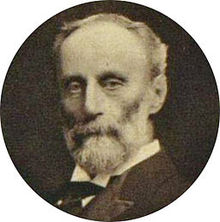Charles Wood, 2nd Viscount Halifax
|
The Right Honourable The Viscount Halifax |
|
|---|---|

Halifax in 1914
|
|
| Personal details | |
| Born |
Charles Lindley Wood 7 June 1839 London, England |
| Died | 19 January 1934 (aged 95) Hickleton Hall, Doncaster, England |
| Resting place | Hickleton Hall, Doncaster, England |
| Nationality | British |
| Education | Eton College |
| Alma mater | Christ Church, Oxford |
| Religion | Anglo-Catholic |
Charles Lindley Wood, 2nd Viscount Halifax (7 June 1839 – 19 January 1934) was a British ecumenist who served as president of the English Church Union from 1868 to 1919, and from 1927 to 1934.
Halifax was born in London; the eldest son of Charles Wood, 1st Viscount Halifax, a prominent Whig politician, and Lady Mary, the fifth daughter of Charles Grey, 2nd Earl Grey. As a student at Eton he was the favourite of William Johnson Cory, his Master, who dedicated his book of Uranian verse, Ionica, to him. Between 1858 and 1863, he studied law and modern history at Christ Church, Oxford.
An Anglo-Catholic, Halifax became influenced by the Oxford Movement, and at the request of Edward Bouverie Pusey, became president of the English Church Union, a society dedicated to the promotion of Catholic principles and practices within the Church of England, in 1868. Along with the Abbé Ferdinand Portal he played a prominent role in the attempt to bring about dialogue between the Roman Catholic Church and the Church of England on the subject of Anglican Orders. Owing to what can only be viewed as a form of obstructionism between Canterbury and Westminster, no constructive dialogue ever came about, however, and the unhoped for result of Halifax's actions was the condemnation of Anglican Orders as "absolutely null and utterly void" in the Papal Encyclical Apostolicae curae. The Archbishop of Canterbury Edward White Benson and the Archbishop of Westminster, Cardinal Herbert Vaughan, can be accused of letting this early attempt at reapproachment fall away due to the narrow-minded vision of each other's place in the English Church during that era. It might also be argued that Pope Leo XIII was led astray by Vaughan and like-minded Roman Catholic scholars who viewed the Church of England as a state church with no real theological authority. Benson, like most Anglican clergy in the power structure viewed any Roman Catholic involvement in England as the "Italian Mission", with not even a toehold worth acknowledging in English Society.
...
Wikipedia
